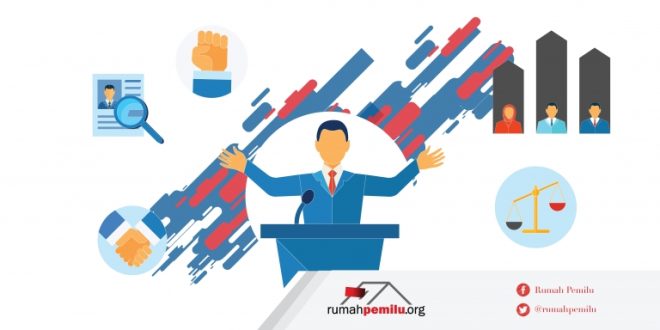The 2024 election is the right moment to reflect on the election process. One thing that is in the spotlight is the anomalous phenomenon of non-linearity that occurred in the presidential-vice presidential election. Gajah Mada University academic Aya Budi, in “A Week After the Election: Quo Vadis of Indonesian Democracy?” revealed that there was an anomalous phenomenon in the 2024 election. He suspected that the effectiveness of clientelism practices in Indonesia was the main cause of the non-linearity phenomenon. Prabowo-Gibran received more than 50% of the vote, but this result does not apply to the supporting parties. Furthermore, the sudden distribution of social assistance carried out by President Jokowi during the 2024 election campaign has become the dominant factor in people choosing candidates who are able to offer solutions that have a direct impact.
For Indonesia, a country that believes in democracy and localism, clientelism will certainly be a big threat. Apart from overturning and eroding democratic traditions, in a local context, clientelism can hinder competitiveness, representation, and local development at the grassroots level. This has a negative impact on regional government governance.
Democratic local government is one of the foundations of modern democracy (Sarkers & Nawaz, 2019:1). This, of course, cannot be separated from the dual trends of democratization and decentralization, which are leading to major changes in the organization and political processes of countries, especially developing countries. There are many studies that analyze these various changes, but very few discuss the dynamics of regional elections and the activities of local-level political parties. Many local aspects tend to be neglected because most academics focus too much on national-scale elections.
In fact, in this era of democratic decentralization, elections at the regional level have become an important component. Local democracy will influence the political life of a regional and central government. Later, the central government will distribute some powers to the regional level to be managed according to the needs of local communities.
Smith (1985) stated that decentralization allows local residents to have a voice and can influence many decision-making processes. Democratization becomes stronger because public officials become more accountable, and public services become better because local governments become more efficient in addressing the needs of their communities than the central government.
However, the sustainability of such local government governance will only be a pipe dream if the electoral democratic process at the local level is unable to uphold its own integrity. Elections are part of the political process in democracy, and every political system also uses elections. However, if the election is corrupted in the process, it is clear that democracy based on the election is fraudulent (Chitlaoarpon, 2017).
Sarker & Khalid (2018) reveal that the social order or political settlement in developing countries is often characterized by clientelism. The expression clientelism is rooted in the socio-economic conditions of the agrarian system, which has major implications for political dynamics in developing countries. This kind of political settlement also encapsulates the behavior of various institutions, including party political activity, elections, local government, and public service delivery.
Clientelism is defined as the ongoing exchange of goods and services between those with greater power and those with less power. This is a long-term relationship with unequal power where identifiable actors exchange goods and services that often involve political allegiance (Grindle, 2016). In simple terms, in an electoral context, clientelism is interpreted as a process in which political parties use privileged access to state resources to strengthen their support in society. Political actors use electoral clientelism as a strategy to enforce their alignment and ensure that voters will remain loyal, delivered in an organized manner to loyal supporters embedded in individual networks and systematically developed by political parties.
In the context of any election, especially regional elections, political parties as local organizations function as an entry point for citizens who want to get involved in electoral politics. They provide information to voters, encourage political participation, and build community among those who share political leanings. Ideally, political parties should rely on policy platforms and ideological appeals to attract voters.
Unfortunately, empirical reality reveals that today’s political parties actually have a tendency to offer selective advantages as direct rewards for gaining electoral votes. Such clientelist parties (or political machines) typically focus on distributing benefits to the poor (Scott 1969: 1150; Stokes 2005: 315, 321–2). Political parties like this are very responsive to exploiting conditions of social inequality at the community level. A situation where the state has failed to provide a social safety net.
It becomes clear that electoral clientelism is something that is very damaging to democracy. This strategy undermines political equality. This is done by allowing parties with resources to buy the votes of the poor, disrupting free and fair elections, and making a mockery of democratic accountability.
Electoral clientelism seeks to weaken and distort programmatic and interest-based political processes. Often, this divides society into networks of competition for votes and access to state-provided goods and services. Everything becomes more possible and achievable when poverty is widespread and resources are scarce.
Incentives that encourage the practice of electoral clientelism specifically silence the political voices of the poor. This group of people is particularly vulnerable to offers of real benefits in exchange for their votes. As such incentives persist, practices of electoral clientelism become increasingly institutionalized.
Democratic participation becomes increasingly weak. Political parties are no longer able to carry out their functions. Parties and other democratic institutions only function as clientelistic machines.
Party leaders will be faced with brokers. They sought to build a clientele to the point where they were able to compete with existing candidates and replace the previous hierarchical structure of parties and electoral power. They trap citizens, especially the poor, in political relationships that silence their voices and policy preferences and even encourage electoral violence.
All of these things pose challenges to democratic ideals. How the values and implementation of citizenship, participation, representation, and accountability are guaranteed in a political system by, by, and for the people. For some, clientelism tends to subside when poverty and scarcity of resources are no longer characteristic of the political system. For others, alternatives to clientelism require not only contextual change but also the availability of more rational ways to mobilize votes and win elections. []
ALYA ROSIANAWATI
Political Science Student, Padjadjaran University
 Rumah Pemilu Indonesia Election Portal
Rumah Pemilu Indonesia Election Portal




